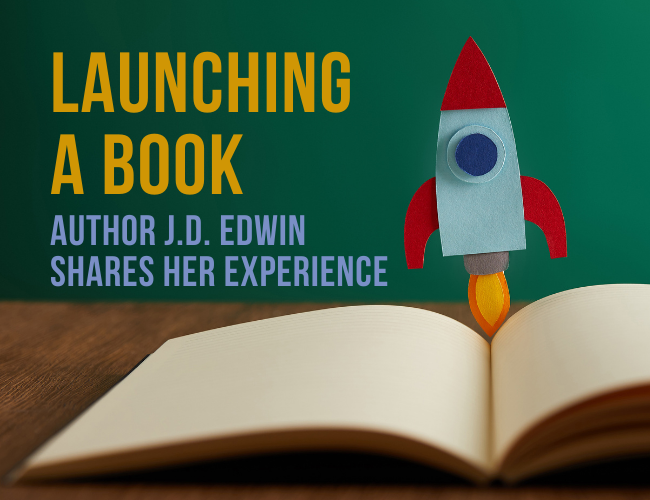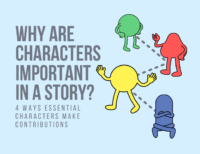Have you ever tried launching a book? Does the idea alone intimidate you, or make you feel completely lost?

When launching a book, there's a lot to learn. Not surprisingly, the best advice comes from writers who have experience in this.
This post is a special segment from author J.D. Edwin. In it, she shares her personal experience about launching her book Headspace, filled with all the essential details you should keep in mind while launching your book.
Launching a Book
It still feels a little unreal to say. Seems not that long ago I was still sitting around pipedreaming of being published. And to be honest, it still feels a little unreal being on the other side of this whole experience, which has simultaneously been exciting, exhausting, fun, stressful, intriguing, and anxiety-inducing.
But more than anything, it’s been humbling.
I learned an incredible amount during the last few months launching a book. Not just about the publishing process, but about myself as well.
I learned how little I knew about being an author, and how much support there is to be found in the community. I learned that some things that sound easy are actually the hardest tasks to complete, and that some that sound tremendously difficult actually aren’t so bad at all.
My next book comes out in December. I think—I know—I still have a lot to learn. But in the meantime, I’d like to share a few big takeaways I’ve learned so far that will hopefully help you on when it's your turn to launch a book.
Be Open to Learning—Especially the Hard Stuff
Are you sick of the word “learn” yet?
I can’t emphasize this enough: to successfully launch a book, you have to be open and willing to learn things you didn’t know.
Accepting this is important because our natural instinct is to shy away from things we don’t know.
Being an author is so much more than being a writer. It is writing newsletters. It is running social groups. It is building and running a website and being your own tech support. It is making inquiries and being able to move on without a pause when the answer is “no.”
A lot of these tasks sound difficult, especially for a newcomer. I know that feeling, and I wasn’t the first or last to shy away from learning book launching steps that had nothing to do with writing. I put them off for another day, then another week. Another year.
It wasn’t until I started getting ready to publish that I realized this attitude is precisely what held me back. All of these book launch steps are part of being an author, and once I finally sat down to learn them, I had a startling realization.
They’re not that bad.
Like anything, the more you do these things, the easier they become. Looking back now, I couldn’t believe I put this part of authoring off for so long, and very much wished I had started sooner.
If you haven’t started learning now, I highly recommend you start.
Build a social media group around your book, get on Twitter and chat with other authors, figure out how to build a website. You do not need to have published a book to do these things. Rather than viewing learning as a chore, get excited!
Every new lesson you learn is a stepping stone to being a working author.
Be Generous
Social media followers do not translate to readers.
Let’s say that again—social media followers do not translate to readers. Nor does it translate to beta readers, ARC (advanced review copy) readers, or book reviews.
It’s easy to fall into the trap of thinking as long as you have lots of followers on a particular social media site, you’ll have a lot of readers. I’ve seen authors who have five to ten times the followers I do come away with a fraction of the reviews.
Followers certainly provide you with a larger audience, but to gain real readers and reviewers, you need to be generous to others.
It’s difficult to remember sometimes that we need to give to others for them to give back. Before we expect the time and effort of others, we must first be generous enough to offer something of ourselves.
This may sound a little confusing at first, but here are a few very simple ways to be generous:
- Read other people’s books. This year I’ve read and reviewed nine books by other authors and have five more on the ever-growing list.
- Promo other people’s books. I regularly push other authors’ new releases on my Twitter account, especially ones I’ve personally read.
- Share your knowledge. Know something useful? Share it! While publishing, I continued to write bi-weekly for The Write Practice and also spent weeks putting together a productivity seminar for the people who bought my book.
- Engage. Sometimes it’s just about reaching out to someone, offering to read their work, chatting, and making a friend.
Being generous is incredibly important. As authors, we must be generous without expectation and help each other. At the end of the day, you will never regret your own generosity.
Be Willing to Look for Opportunities
There’s a saying that if you’re always thinking about yellow cars, you’re going to see yellow cars everywhere. What if you always look for opportunities instead?
The thought of marketing myself as an author used to seem so daunting. I had no clue where to start. Where do I even go? Who do I talk to? What is even the first step?
As it turns out, starting to look for opportunities involved only one simple step—talk to people.
Family and friends? Tell them about your book.
Co-workers? Bring it up in conversation.
Strangers ask about your hobbies? Mention you have a book out.
By simply talking about my book to people, I was able to be featured on the websites of at least half a dozen authors.
I found out, after chatting with an associate, that my local bookstore chain sometimes carries local authors and I could submit my book to be considered. I found two librarians willing to look into ordering it for their library, and a third person who has similar connections she can look into.
I have a chance to be on an authors’ podcast. I learned that there are websites where you can submit your book for a chance to be reviewed. And a close, long-time friend turned out to not only be a fan of my book, but also has retail experience that has translated into valuable help in marketing.
These things were always there. They aren’t new. But until I started looking for them, I had no idea they existed.
Once I started finding a few, more and more of them became apparent. As new authors, it’s easy to be self-conscious and feel like there’s no good place to start. But trust me, talk to one person, then another. Before you know it, you’ll see those opportunities everywhere.
Be Ready for the Long Haul
We’ve all had that dream—sitting in some secluded room, locked away from the world, writing our books. When a book is written, we hand it to a faceless publisher who takes care of everything, then move onto the next book.
The truth, as most of us know, is a little more complicated and a lot more chaotic. We don’t simply write a book, throw it out into the universe, and move on to the next. Launching a book is messy, busy, and a lot of work. It’s a high like no other, and a major milestone when all of your hard work comes together.
But when it’s over, you might feel a lull.
The people who gathered to watch the book take off have now moved on with their lives. The promotions are done. The book is released. There is a sense of sudden quiet that follows.
One that makes you wonder: What now?
It’s tempting to want to move onto something new. The next book. The next story. But the truth is, the work is far from over. Your book is out in the world now, but it continues to depend on you to move it forward.
The worst thing you can do to the work that you took so much time and effort to write is to let it sink into obscurity because you, the author, have lost interest in marketing.
I’m still navigating this myself, working on projects such as designing swag, keeping the launch team active, and continuing to talk about the book and request reviews.
To be perfectly honest, this all feels overwhelming at times—the idea that the work is never done.
But it’s also exciting at the same time, to know there’s still so much I can do to move my book one millimeter up the charts at a time.
So don’t think of your launch as one day. Think of it as one step toward your book’s future.
Believe in Your Story
This is the big one.
You might ask: “How can I possibly not believe in my story? I wrote it. I love it. How can you think that I wouldn’t believe in it?”
Well.
Do you believe in your story enough to be willing to talk about it to anyone who asks?
Do you believe in it enough to openly call yourself an author?
Do you believe in it enough to be willing to learn all the hard, technical stuff you don’t like, and know it will pay off?
Do you believe in it enough to keep promoting it even if the initial launch isn’t the big fanfare you dreamed of?
Do you believe in it enough to not let disappointment convince you that you should shelf your entire author career because this book wasn’t an overnight hit?
I always thought I believed in the stories I wrote, but as I sat down to think about each one of these questions, I had to admit that at some point or other, the answer to one or more of them was “no.”
Believing in your story means more than loving what you wrote. It means being willing to carry on doing the work, to continue to advocate for your book, even when results don’t pan out the way it should.
I launched a book. I love it. But believing in it took a little longer. Today, I can firmly say that the answer to each one of these questions is a resounding “yes!”
Love Your Launch
Maybe your launch goes well and you become a sensation right away. Maybe your launch flops and you’re staring at two sales a month after release. Most likely you’ll land somewhere in between. Most of us do.
But that doesn’t mean you shouldn’t love your process. At the end of the day, a book launch means you’ve put a piece of yourself out into the world, a story that you should be proud of.
If you’ve found nothing else helpful from my experience, I hope to still leave you with this—every bit of effort is worth it, and the only thing you’ll regret is not trying.
So try it. Launch your book. And keep writing.
Have you tried launching a book? What lessons did you learn from it? Let us know in the comments.
Practice
Today's practice exercise is a little different. For today, I'd like you to spend fifteen minutes thinking about what scares you the most about launching a book.
When you're done, share this in the comments.
And then! Respond to one or two other writers. Give some advice on how to tackle the book launch step that worries them the most. Or, if you don't have any advice, offer some genuine words of encouragement. Maybe you'll connect beyond the comments.
Maybe you can start reading and supporting one another' books.







0 Comments